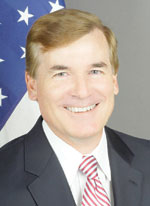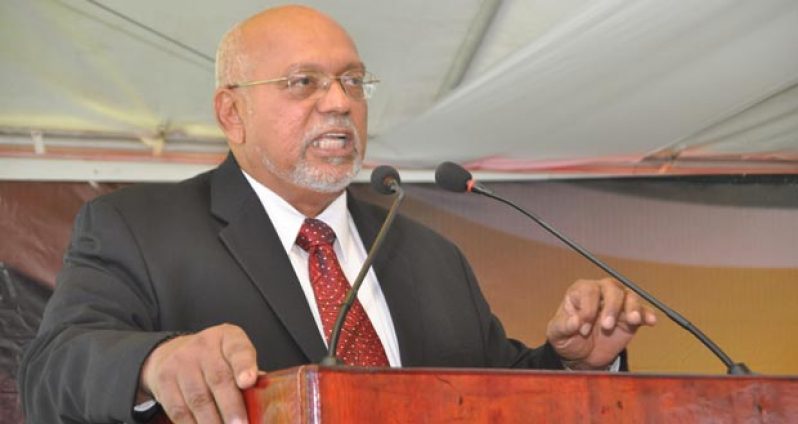PRESIDENT Donald Ramotar yesterday rejected the position taken by outgoing US Ambassador, Brent Hardt on the use of the critically important Anti-Money Laundering and Countering the Financing of Terrorism (AML/CFT) (Amendment) Bill as a bargaining chip.

In an article published in yesterday’s edition of the Kaieteur News, under the headline, ‘Bargaining over AML Bill for compromise is democratic – US Ambassador’, Hardt said using the Bill to negotiate or bargain is “not only acceptable, but it is the very essence of democracy,” even as he acknowledged the importance of having the Bill passed.
The President told the Guyana Chronicle in an invited comment that this is one of several areas where positions differ between Guyana and the US.
NO BARGAINING CHIP
“This is one of the areas we differ on,” he said. “I think this (the Bill) is too important an issue; it has too great an implication for our country for it to be a bargaining chip.”
Both Opposition parties, A Partnership for National Unity (APNU) and the Alliance For Change (AFC), have linked conditionalities to their support for passage of the AML/CFT (Amendment) Bill. APNU proposed three amendments, which were included in that party’s draft amendments to the Principal AML/CFT Act, and President Donald Ramotar said those would be supported by his Government were APNU to agree to pass the AML/CFT (Amendment) Bill. This offer was rejected.
Additionally, APNU’s position is an ‘all-or-nothing’ one, as that Party maintains its demands not only for its amendments to be fully included in the Bill, but has also restated its call on the President to give his assent to several Bills passed in the National Assembly, including the Local Authorities (Elections) (Amendment) Bill 2013, which states that elections must be held on or before August 1, 2014.
‘I think this (the Bill) is too important an issue, it has too great an implication for our country for it to be a bargaining chip’
— President Donald Ramotar
President Ramotar has already forwarded his explanation for his non-assent to the National Assembly.
On the other hand, the AFC, which fully supports the APNU position, is demanding establishment of the Public Procurement Commission (PPC), which the Government has agreed to, provided that Cabinet retains its no-objection role in the process; but the latter position has been rejected by the AFC. However, on May 29, after the announcement by CFATF, the AFC, in a statement, noted that it is now willing to budge on its position and support Cabinet’s retention of its no-objection role.
PATRIOTIC STANCE
The Head of State repeated his earlier calls for a sense of patriotism to prevail to ensure that average Guyanese are spared the consequences of sanctions by the international watchdog, the Financial Action Task Force (FATF), over the non-enactment of the Bill.
“I think it is something that calls for patriotism, because, as a poor and developing country like ours, the impact will be felt more than in a huge country like the United States,” President Ramotar said.
He stressed that the issue at hand is bigger than narrow political plays, particularly since it is the welfare of the Guyanese people, regardless of whether or not they are supporters of the Government, and that of the country that is at stake.
“A lot of this has to do with patriotism and love of country, which is what this Bill demands at this point in time,” the President said.
The Bill to meet the requirements of the FATF-Style Regional Bodies (FSRB), the Caribbean Financial Action Task Force (CFATF), was tabled in the National Assembly in April 2013, but was referred to a Parliamentary Special Select Committee and was eventually voted down by the combined Opposition in November 2013. The Bill was re-tabled in December 2013, and was again referred to the Parliamentary Special Select Committee chaired by Ms. Gail Teixeira, where it has since been.
Government has repeated its willingness to have the Bill passed, and has demonstrated its commitment to same, but up to the last meeting of the Special Select Committee, Government remained locked in political gridlock with the combined Parliamentary Opposition.
(By Vanessa Narine)



.jpg)








